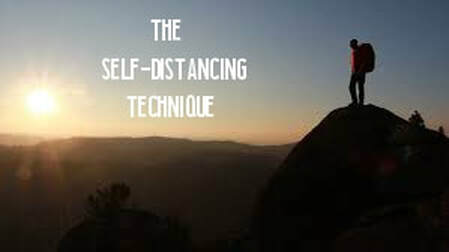We usually deal with negative emotions in three ways...we either try to suppress them, express them, or escape them, all three of which are typically not a healthy approach. Research suggests that instead, it can be beneficial to process and reflect on our negative feelings. When most of us try to do this, it can be easy to start ruminating and get caught in the loop of repetitive, detrimental thoughts. We spin the story over and over in our heads. We tell ourselves things like, "I will never be good at this."
Gaining perspective on negative events, or “self-distancing,” is a practice that allows us to view our feelings and experiences from an outsider’s perspective. This can be accomplished with language...saying “you” or “she” rather than “I". Using phrases like “Tracy is feeling frustrated right now" or referring to yourself in the third person. The most important thing is to not use the term “I” or "I am" (there is a lot of energetic power in whatever words we put behind the statement "I am").
In everyday life, we typically think and talk about ourselves using first-person pronouns like “I” and “me.” Using self-distanced language...like “you” or “he"...means that we’re referring to ourselves the way we usually refer to others. This linguistic shift seems to create a cognitive shift, allowing us to gain perspective on whatever is going on.
Self-distancing can also be accomplished by visually imagining your own experience from a distance like you are watching a movie rather than reliving it through your own eyes, to take the perspective of an outside viewer, seeing yourself from afar. Mentally removing yourself form the situation is a helpful trick. To try it, you can imagine that you’re a fly on the wall, observing your situation, or you can imagine you are standing on top of a mountain looking down over the events. How do you see the situation? How do both people look...you and the other person? By cultivating a broader perspective, you’ll often discover that the situation is not as bad as you thought it was.
Research has shown that taking this perspective reduces the intensity and duration of negative emotional experiences. Reducing anger, sadness and other negative emotions around a distressing event, as well as minimizing negative unproductive recurring thoughts.
Studies also suggests that self-distancing encourages us to think in more abstract terms rather than focusing on the details and feelings. When doing this, we are more likely to have realizations, deeper understanding and closure. This allows us to manage difficult feelings without getting swept up in them.
I invite you to try the technique of self-distancing next time you become aware of a negative emotion. Be mindful of the language and thoughts you are creating around the emotion and visualize it from a different broader perspective. Next week I'll share an additional technique that has also been very useful to me in handling negative emotions, feelings and sensations.

 RSS Feed
RSS Feed
